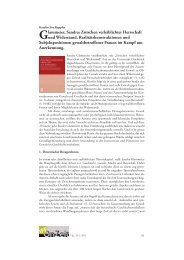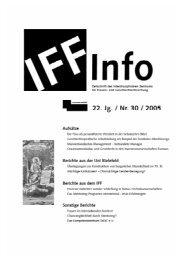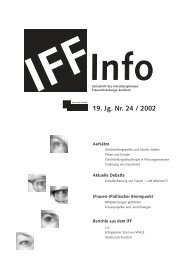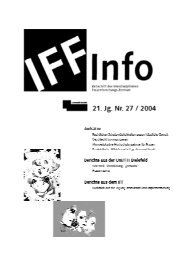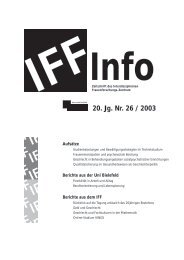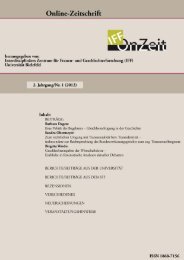IFFOnZeit Nr.1, 2009
IFFOnZeit Nr.1, 2009
IFFOnZeit Nr.1, 2009
Erfolgreiche ePaper selbst erstellen
Machen Sie aus Ihren PDF Publikationen ein blätterbares Flipbook mit unserer einzigartigen Google optimierten e-Paper Software.
Rezensionen<br />
Research” Helene Füger (University of Fribourg, Switzerland), Nikolina Sretenova (Bulgarian<br />
Academy of Sciences, Sofia, Bulgaria), Christine Brunn (University of Stuttgart,<br />
Germany), Dagmar Höppel (University of Stuttgart, Germany), Evi Genetti (University<br />
of Vienna, Austria) and Sabine Lask (University of Bern, Switzerland) introduce the<br />
EU-funded project Eument-Net, a cooperation between university mentoring projects<br />
in different European countries. “Eument-Net initiative is designed to facilitate the exchange<br />
of experiences, the transfer of knowledge and the cooperation among mentoring<br />
programmes and stakeholders in gender equality in higher education and research, across<br />
Europe” (p. 162), and aims to promote the advancement of women’s career by developing<br />
a European network of mentoring programmes. Carmen Leicht Scholten (RWTH<br />
Aachen, Germany) presents in her paper “Where is the Key to Success? A Comparative<br />
Evaluation of Mentoring Programmes for Outstanding Female Scientists in Natural<br />
Science, Engineering, Social Science and Medicine” results of an evaluation based on a<br />
survey of eight mentoring programmes at different universities and in different disciplines<br />
in North-Rhine Westphalia (Germany). One of her findings is that different disciplinary<br />
cultures obviously also have an influence on different needs, kinds of programmes and on<br />
various preferences in kinds of mentoring relationships.<br />
Inken Lind (Center of Excellence Women and Science, Bonn, Germany) starts<br />
her paper “Balancing Career and Family in Higher Education New Trends and Results”<br />
with an overview of current empirical studies as well as theoretical discourses on<br />
parenthood and academia. This overview shows inter alia that 1. “(…) there are vast<br />
differences in childlessness and number of children among academics in various European<br />
countries” (p. 12), 2. “there is currently no evidence for a monocausal relationship<br />
between children and low career options for female scientists” (p. 195) as sometimes mentioned,<br />
3. results of newer studies in Germany state beside a continuing high proportion<br />
of childless female scientists a clear increase of childlessness among young male scientists,<br />
4. balancing career and family is still a continuous problem, especially in the German<br />
science system. At the end the author introduces a new CEWS research project called<br />
“Balancierung von Wissenschaft und Elternschaft” (BAWIE) focusing on the process of<br />
balancing science and parenthood and the reciprocal effects between individual decision<br />
making and organizational structures (in Germany). On of the goals of this project is<br />
to get more information about adequate conditions for women and men to balance a<br />
scientific career with parenting and to find new starting points for targeted measures in a<br />
“work-life-balance-oriented” university policy.<br />
Conclusion: From the reviewer’s point of view, international perspectives on gender<br />
equality programmes in higher education, as collected in this anthology, are highly<br />
important. They create chances to share experiences of different countries, to broaden<br />
knowledge about forms and patterns of resistance against gender equality policies as well<br />
as successful strategies and implementation processes of gender equality measures within<br />
different or similar institutional settings. For researchers and practitioners international<br />
perspectives are at least helpful for a critical reflection of their own gender equality discussions<br />
and measures in their own countries or universities. The anthology ends with<br />
general recommendations for gender equality programmes, based on the findings of the<br />
5 th Conference on Gender Equality in Higher Education 2007 in Berlin. These could be<br />
supportive for further university and equal opportunity policies. Altogether, the reviewer<br />
recommends the anthology to all people who are interested in gender equality policy and<br />
1. Jg., Nr. 1, <strong>2009</strong><br />
152



